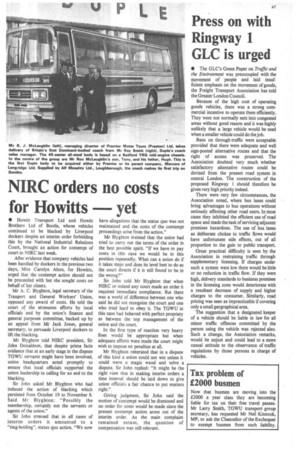NIRC orders no costs for Howitts yet
Page 53

If you've noticed an error in this article please click here to report it so we can fix it.
• Howitt Transport Ltd and Howitt Brothers Ltd of Bootle, whose vehicles continued to be blacked by Liverpool dockers despite an interim order forbidding this by the National Industrial Relations Court, brought an action for contempt of court to NIRC last week.
After evidence that company vehicles had been handled by dockers in the previous two days, Miss Carolyn Alton, for Howitts, urged that the contempt action should not be proceeded with but she sought costs on behalf of her clients.
Mr A. C. Blyghton, legal secretary of the Tranport and General Workers' Union, opposed any award of costs. He told the court of the strenuous efforts by local officials and by the union's finance and general purposes committee, backed up by an appeal from Mr Jack Jones, general secretary, to persuade Liverpool dockers to lift the blacking.
Mr Blyghton told NIRC president, Sir John Donaldson, that despite prima facie evidence that at an early stage in the dispute TGWU servants might have been involved, union headquarters acted promptly to ensure that local officials supported the union leadership in calling for an end to the blacking.
Sir John asked Mr Blyghton who had induced the action of blacking which persisted from October 19 to November 8. Said Mr 131.yghton: "Possibly the membership, certainly not the servants or agents of the union."
Sir John stressed that in all cases of interim orders it amounted to a "ring-holding", status cLuo action. "We now have allegations that the status quo was not maintained and the costs of -the contempt proceedings arise from the action."
Mr Blyghton insisted that the union had tried to carry out the terms of the order in the best possible spirit. "If we have to pay costs in this case we would be in this position repeatedly. What can a union do if it takes steps and does its level best to do as the court directs if it is still found to be in the wrong?"
Sir John told Mr Blyghton that when NIRC or indeed any court made an order it required immediate compliance. But there was a world of difference between one who said he did not recognize the court and one who tried hard to obey it. The TGWU in this case had behaved with perfect propriety as between the top management of the union and the court.
In the first type of reaction very heavy fines would be appropriate but when adequate efforts were made the court might wish to impose no penalties at all.
Mr Blyghton reiterated that in a dispute of this kind a union could not win unless it could wave a magic wand and solve a dispute. Sir John replied: "It might be the right view that in making interim orders a time interval should be laid down to give union officials a fair chance to put matters right."
Giving judgment, Sir John said the motion of contempt would be dismissed and no order for costs would be made since the present contempt action, arose out of the interim order. As the main complaint remained extant, the question of compensation was still relevant.
































































































































































